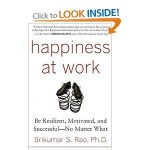Have you ever noticed that we all have “if only” thoughts that keep us from pursuing our dreams? For example:
- If only I had more time …
- If only I had more money …
- If only I had technical skills ….
- If only I got my MBA …
I started noticing this thought pattern in my head when I joined NextSpace, a co-working rental work space, six months ago. I decided to rent space outside of my house, since
working from home sucked. Since joining, I started meeting all kinds of entrepreneurs. I met one entrepreneur, Nick, who is developing iPhone games for kids. I thought – “How cool is that! He must be an engineer, or knows how to code. If only I could code myself, I could start a tech company, too.”
You may be nodding at this point, thinking the same thing. As it turns out, Nick’s background is actually similar to mine: MBA, consulting experience, then corporate experience in Marketing. After we got to talking, I found out that he outsources the coding aspect to a team in the Philippines, and does the design and marketing research himself. Immediately, I thought: “
If only I knew how to find good coding resources offshore, I could do the same thing.”
There’s a pattern here — for some reason, instead of thinking of what I want to do, I come up with “if only’s” about why I can’t do x y and z. “If only’s” can be endless, since there is always something we don’t know how to do. I started to realize that I hide behind “if only” statements, and if I keep doing that, all I am doing is playing the victim of circumstance in my career and in life.
So I ask you – do you ever find yourself saying “if only xyz, I would be able to do abc?” If so, perhaps you can join me in changing the situation, and become the driver instead of the victim. Say this instead: “I want to do abc. Now let me figure how I can get there. Maybe there are some skills I can learn myself, and others I can learn how to outsource.”
This new statement assumes an underlying confidence that if I truly want to do something, I can figure out how to get it done. Do you believe this to be true?
This new perspective can be powerful for a job search, on the job success, or any challenging life situations.
- Job Search Example – You may find yourself in a defeated thought pattern: “If only I had a better education…If only I knew how to write a better resume…” These are all negative thoughts about things you don’t have. It gives us an excuse not to get a job, because we focus so much on our deficiencies. How can companies see the best side of you if you keep focusing on what you aren’t good at? If you’re thinking this way, it’s time to change your perspective: “I am good at x y and z. How can I get the best job possible with the skills I have already? What job search skills can I learn now to get better opportunities in the market?”
- On the Job Success Example – You didn’t get the promotion that you were hoping for. You can either choose to blame yourself or others for this: “If only I spoke up more at meetings, like Steve…If only I knew how to play office politics…” Again, negative thought patterns! Focus on what it may take to get promoted next year — learn skills to build your reputation; learn skills to communicate better; learn how to play politics fairly. All of this is possible if you are in action mode.
I guess my point is
our inner thoughts can be powerful in motivating or de-motivating us. “If only” is a phrase that often demotivates. It is important to cherish our strength, have confidence in our ability to learn and persevere, and have a positive mindset if we want to accomplish anything. I think these two quotes I found on Twitter best summarize what I want to say in this post:
- “Limitations live only in our minds. But if we use our imaginations, our possibilities become limitless.” Jamie Paolinetti
- “Once you replace negative thoughts with positive ones, you will start having positive results.” Willie Nelson
I hope this post inspires you to have positive thoughts that lead to positive results in your career and life.
Like this article? then check out our Soft Skills Gym, a 24/7, members only learning community for soft skills development and career advancement. Also, help me out by sharing this post on Linkedin, Email, Twitter, Facebook, Google+, etc. ... read more




